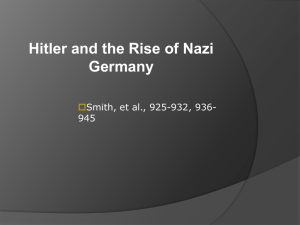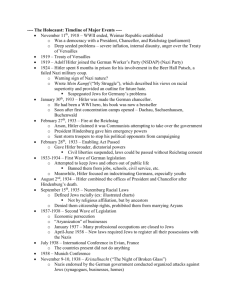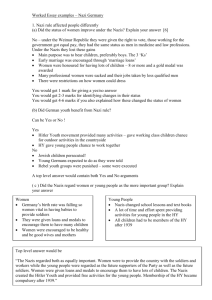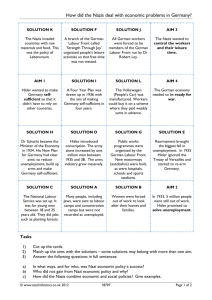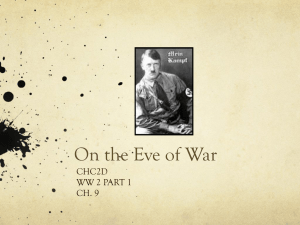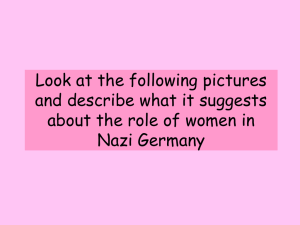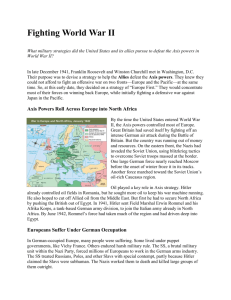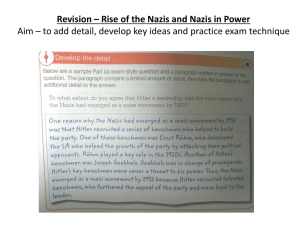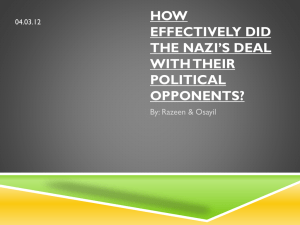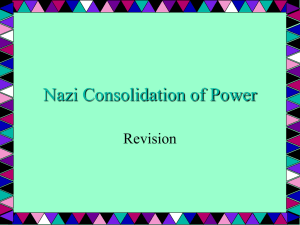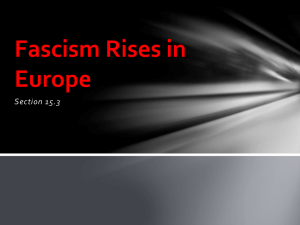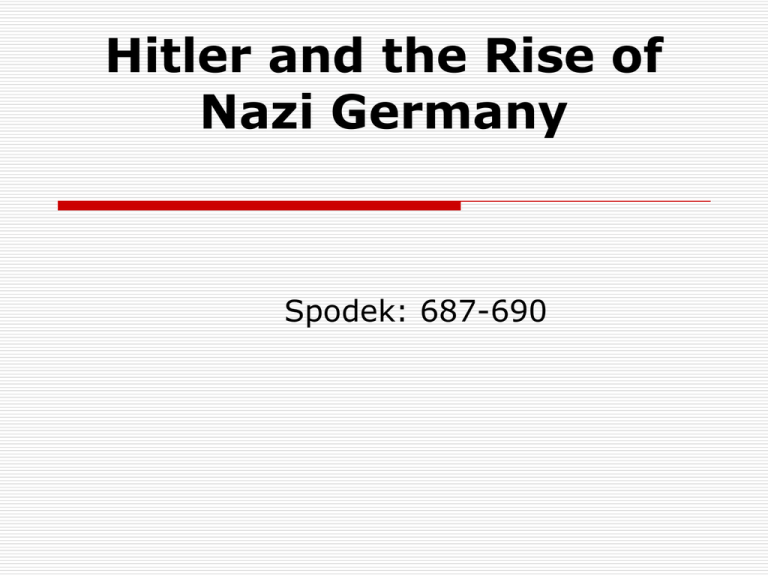
Hitler and the Rise of
Nazi Germany
Spodek: 687-690
Why the Nazis could rise to
power in Germany
Defeat in World War I
Versailles Treaty—England and France “Stabbed
Germany in the Back”
Great Depression: High Employment, Low
Profits, People Lose Savings
German Military Tradition: Frederick the Great—
Prussia; Otto Von Bismarck—Unified Germany;
Luddendorf; Hindenburg
Anti-Semitism—Jews as Scapegoats: “Had all
the jobs”; “Controlled Politics”; “Had all the
money” (None of the above was true but it
didn’t matter)
Adolph Hitler
Emblematic of German
Problem:
Only success came in
war—won a minor medal
Believed that Germany
“stabbed in the back”
Germany should have won
the war
Unemployed after the
war—no jobs
Couldn’t get into art
school—claimed only Jews
got in. He had no artistic
talent
Formed a paramilitary
group to substitute for
Germany Army—National
Socialists
Adolph Hitler (continued)
Hitler promised Germans:
Stability
Jobs
To be Proud Again
To Reverse the Versailles Treaty
To End “Weak” Democracy
To “Get Rid of” the Jews
Lebenstraum— “Living Space for
Germans”
Fascism
Nation comes first
Against Liberalism and
Liberal Institutions
Irrational Politics—
Emphasize Street
Fighting
SA Storm Troopers
(Ernst Rohm)—they
wanted to get rid of
Nazi’s enemies. They
were called the “Brown
shirts”
SS—Schutzstaffel
(Heinrich Himmler)—
they were called the
black shirts.
Key Dates
October 1929—Great Depression
Summer-Fall 1932 –German
Elections: Nazis win a majority: 230;
Socialists 133, Center 97,
Communists 89
The main points: Nazis won 42% of the
vote; no center; Nazi’s powerful but
can’t form government.
Key Dates Continued
President Hindenburg
Names Hitler Chancellor in
January 30, 1933.
Street Violence
February 27 Reichstag
Fire—Legislature Building
Burns Down
March 5 New Elections:
Nazis 288; Nationalists 52;
Center 74; Socialists 120;
Communists 81; Others
23—Nazis win only 44% of
vote
March 23, 1933—Reichstag
passes (with huge majority)
the Enabling Act which
made Hitler dictator until
April 1, 1937
July 14, 1933—Nazi Party
was made only legal party
November 12, 1933 Nazis
win 92% of the vote
Main Point:
Only at this date does
Hitler behave illegally
July 1934-SS and Army
purge the SA and they
begin to secretly arm
the army
1935 Denounces
Versailles Treaty
1936 Remilitarizes the
Rhineland
The Nazi Revolution
June 30 “Night of the long knives” – Nazis
kill 77 people, mostly high ranking SA
members—Ernst Roehm, Gregor Strasser
August 1 Law combining President and
Chancellor
August 2 Death of President von
Hindenburg
August 19 Plebiscite approves Hitler as
President with 88% voting yes
1936-1937 Four Year Plan
War materials
Industrialization
Autobahn
VW
Daimler-Benz
General Motors
Ford
Racism in Nazi Germany
Belief German “Aryan” Race
Master Race
Jews inferior
Slavs inferior
Gypsies inferior
Eugenics-Social Darwinism run
amok
1935 Nuremberg Laws
Identify Jews (with Yellow Star
Deprive Jews of Citizenship
Allows only so many Jews in
specific jobs
Outlaw marriage and sex
between Jews and non-Jews
9 of November 1938
Night of Broken Glass or
Kristallnacht
In response to
assassination of German
diplomat in Paris:
Nazis set synagogues
on fire
Broke Jewish shop
windows
Beat up Jews—91
killed; thousands
injured
Confiscated Jewish
property
Jews forbidden to
collect insurance
20,000+ Jews sent to
concentration camp
Why Hitler?
War Vets—Hated Government for Losing
the War
Middle Class—Ruined by Inflation,
Depression
Workers—Unemployed
Industrialists—Hated Socialist Labor
Struggle
More than economy/defeat:
Emphasized a cult of war, physical danger,
sexuality, future, speed, a “new life”
Airplanes, car, radio
Goebbels and Riefenstahl
Goebbels was the
Chief Propaganda
Officer. He
promoted radios.
By 1942, Germany
had 23 million
radios
Leni Riefenstahl
was Hitler’s
filmmaker.
“Triumph of Will”
and “Olympiad”
Hitler’s Road to War
March 1938—Annexed Austria
1938 German minority in Sudetenland
(Czechoslovakia)
September 1938– “Munich Crisis”
Appeasement
Chamberlain— “There will be peace in our Time”
Spring 1939 Annexed all of Czechoslovakia
Summer 1939—Nazi-Soviet “Non
Aggression Pact”
World War II in Europe
1 September 1939 Nazis
invade Poland
3 of September 1939
England, France declare war
on Germany
Hitler defeats Poland in a
month
“Phony War” (September
1939- May 1940)
May 1940 Germany invades
the Netherlands, Belgium,
Luxembourg, and France
“Battle of Britain”
22 of June 1941 Germany
invades Soviet Union.
1941 First Extermination
Camp Created


